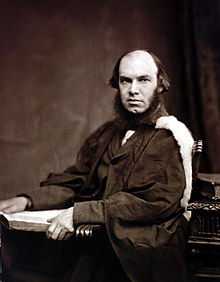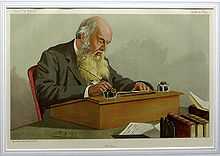Edward Caird


Edward Caird FRSE (23 March 1835 – 1 November 1908) was a Scottish philosopher.
Life
The younger brother of the theologian John Caird, he was the son of engineer John Caird, the proprietor of Caird & Company,[1] born at Greenock in Renfrewshire, and educated at Greenock Academy and the Universities of Glasgow and Oxford (B.A. 1863). He became Fellow and Tutor of Merton College. In 1866, he was appointed to the Chair of Moral Philosophy at Glasgow, which he held until 1893. In that year he became Master of Balliol College, from which he retired in 1907.
In May 1902 he was at Carnavon to receive the honorary degree D.Litt. (Doctor of Letters) from the University of Wales during the ceremony to install the Prince of Wales (later King George V) as Chancellor of that university.[2]
His more important works include Critical Philosophy of Kant (1877), Hegel (1883), Evolution of Religion, Social Philosophy and Religion of Comte (1885), and Evolution of Theology in the Greek Philosophers (1904).
The philosopher John Watson was among his students at the University of Glasgow.[3]
Works
Books
- The Collected Works of Edward Caird, 12 volumes, ed. Colin Tyler, Bristol: Thoemmes Press, 1999
- A Critical Account of the Philosophy of Kant, with an Historical Introduction, Glasgow: J. Maclehose, 1877
- Hegel, Philadelphia: J. B. Lippincott and Co.; Edinburgh: W. Blackwood and Sons, 1883
- The Social Philosophy and Religion of Comte, Glasgow: J. Maclehose and Sons, 1885; New York: Macmillan, 1885
- The Critical Philosophy of Immanuel Kant, Glasgow: J. Maclehose and Sons, 1889; New York: Macmillan, 1889 (2 volumes) Volume 1 Volume 2 second edition 1909
- Essays on Literature and Philosophy, Glasgow: J. Maclehose and Sons, 1892 (2 volumes) Volume 1 Volume 2
- The Evolution of Religion, Glasgow: James Maclehose and Sons, 1893; New York: Macmillan, 1893 (Gifford Lectures 1890-92; I, II)
- The Evolution of Theology in the Greek Philosophers, Glasgow: J. Maclehose and Sons, 1904 (Gifford Lectures, 1900–02; I, II)
- Lay sermons and addresses, delivered in the Hall of Balliol College , Oxford (1907)
Pamphlets
- The Problem of Philosophy at the Present Time: an Introductory Address Delivered to the Philosophical Society of the University of Edinburgh, Glasgow, James Maclehose & Sons, 1881
- The Moral Aspect of the Economical Problem: Presidential Address to the Ethical Society, London, Swan Sonnenschein, Lowrey & Co., 1888
- Address on Plato's Republic as the Earliest Educational Treatise, Bangor: Jarvis & Foster, 1894
- Individualism and Socialism, Being the Inaugural Address to the Civic Society of Glasgow (1897)
- Idealism and the Theory of Knowledge, London: Henry Frowde, 1903
Bibliography
- Sir Henry Jones and John Henry Muirhead, 'The Life and Philosophy of Edward Caird], Glasgow: Maclehose, Jackson and Co., 1921
- Colin Tyler, Edward Caird, in Dictionary of Liberal Thought; Brack & Randall (eds.), Politico's 2007 pp 54–56
References
- ↑ "Former RSE Fellows 1783–2002" (PDF). Royal Society of Edinburgh. Retrieved 19 September 2010.
- ↑ "The Royal visit to Wales" The Times (London). Monday, 5 May 1902. (36759), p. 10.
- ↑ http://www.giffordlectures.org/Author.asp?AuthorID=176
External links
| Wikisource has original works written by or about: Edward Caird |
- Edward Caird works, on the Internet Archive
- The life and philosophy of Edward Caird, by Sir Henry Jones and John Henry Muirhead (1921), on the Internet Archive
- The Internet Encyclopedia of Philosophy
- Edward Caird biographical notes and Lectures online at the Gifford Lectures website
- Edward Caird's grave in St Sepulchre's Cemetery, Oxford, with biography
-
 Chisholm, Hugh, ed. (1911). "Caird, Edward". Encyclopædia Britannica (11th ed.). Cambridge University Press.
Chisholm, Hugh, ed. (1911). "Caird, Edward". Encyclopædia Britannica (11th ed.). Cambridge University Press. - Cousin, John William (1910). "
 Caird, Edward". A Short Biographical Dictionary of English Literature. London: J. M. Dent & Sons. Wikisource
Caird, Edward". A Short Biographical Dictionary of English Literature. London: J. M. Dent & Sons. Wikisource
| Academic offices | ||
|---|---|---|
| Preceded by Benjamin Jowett |
Master of Balliol College, Oxford 1893-1907 |
Succeeded by James Leigh Strachan Davidson |
|